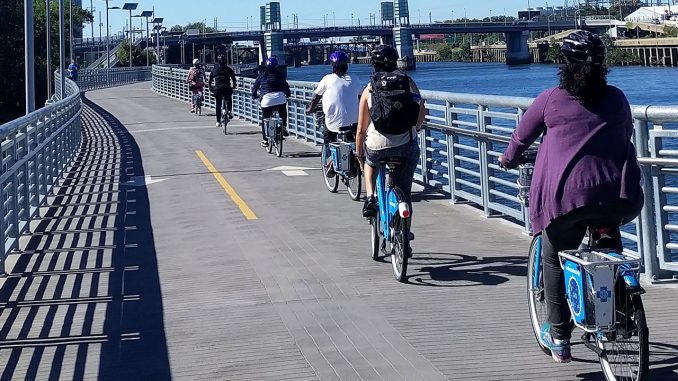
Growing up in Topeka, Kansas, Gretchen Snethen associated bikes with freedom. She used them to get around her hometown without having to rely on anyone else.
“I could bike on my own to my friend’s house,” Snethen said. “We were no longer confined to the house or requiring our parents to take us places.”
Now, the therapeutic recreation professor is working to bring that freedom to people who have mental illnesses.
In Summer 2016, Snethen pioneered ICAN:BIKE, a program that helps people with psychiatric disabilities and mental health issues in Philadelphia access and use the city’s bike share program, Indego.
Snethen is the assistant director of the Temple University Collaborative on Community Inclusion of Individuals With Psychiatric Disabilities. Funded by the National Institute on Disability, Independent Living, and Rehabilitation Research, the collaborative develops and tests methods for promoting mental health patients’ community participation.
ICAN:BIKE developed as a spin-off of another one of Snethen’s projects for the Collaborative, I-CAN, or Independence through Community Access and Navigation. The I-CAN intervention helped participants identify leisure and recreation activities and help them access community resources, from movie theaters to art classes, so they could independently participate.
In interviews for I-CAN, many people expressed interest in exercise or physical activity, Snethen said. When asked about barriers to accessing preferred activities and community resources, transportation to the activities was a common response.
Biking seemed like the perfect intersection of exercise and lack of transportation, Snethen said.
She added that the program was also motivated by the proven link between improved mental health and exercise.
According to the American Psychological Association, exercise can help alleviate long-term depression. The Alzheimer’s Association also endorses physical activity as a potential way to reduce the risk of dementia.
Snethen and the collaborative’s recreational therapist, Brandon Snead, reached out to COMHAR, a Philadelphia-based mental health service agency, to ask if they could recruit participants by presenting the idea for ICAN:BIKE at the agency’s community meeting. After collecting a group of four participants, the pilot program began in July 2016.
Since then, there have been two groups — each have had eight to 10 participants.
Snead and Snethen first taught a series of classes on the basics of Indego use. Participants learned how to find Indego stations, sign up for membership, fit and use helmets and ride the bikes.

They then taught participants safety precautions and rules of the road, including how to use hand signals and ride over trolley tracks and cobblestones. Often, Snethen said, this entailed dispelling misconceptions participants had about urban biking.
“A lot of folks had these old wives’ tales, like you should bike against traffic so that people see you, or just bike the sidewalks, which is technically illegal in Philadelphia,” Snethen said.
After practicing in a parking lot on Main Campus, Snethen and Snead led one group ride around the city. All participants left with a six-month pass for Indego.
“We were just trying to figure out, like logistically, does this work?” Snethen said. “What do people need in order to feel confident and successful?”
Instead of planning all the trips himself, Snead said he encourages the group members to map out their own routes based on destinations that interest them. During one ride, he said, they stopped at a library to sign participants up for library cards. On another, they got off their bikes to use the hammocks at Spruce Street Harbor Park.
The goal of the project was to have the riders eventually be able to bike on their own.
“It’s a structured outing that we do, but we try to leave the consumers with as many opportunities to choose as possible, because they’re going to be making those choices without us very soon,” Snead said.
After receiving positive feedback from participants, Snethen and Snead led two larger sessions in the summer and fall last year. These rides also included COMHAR’s staff, who the collaborative trained to begin leading the program.
Following the third session in the fall, COMHAR took over management of ICAN:BIKE. The agency plans to start group rides again in the spring or summer.
Louis Walker, a 46-year-old Germantown resident who participated in last year’s summer session, had never ridden a bike prior to the program. Having signed up to get more exercise, he said the program also helped him make friends and has given him the confidence to use Indego on his own.
“I just really enjoy biking, and I want to help other people in the Germantown area bike and go out to new parts of the city,” Walker said.
Though COMHAR is now in charge of the day-to-day operations of the program, the collaborative continues to work on ICAN:BIKE. Snethen said she and her co-workers are creating a manual to help mental health agencies in other cities implement a similar program. They are also working to secure grant funding to perform a larger analysis of the outcome data to determine whether the program actually improves mental health.
Snethen attributes the success of the program to how it defies expectations of traditional mental health group sessions, and it allows participants to identify with something other than their psychiatric disabilities.
“It’s no longer about, ‘I’m a person with mental illness,’” Snethen said. “It’s, ‘Oh, I’m a biker, just like everyone else.’ If all you’re talking about is your problems, then it’s hard to see people in that light where they’re competent and they’re confident and they’re successful.”



Be the first to comment